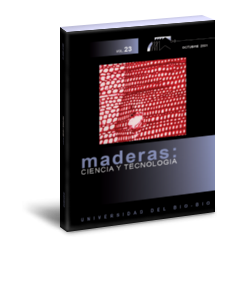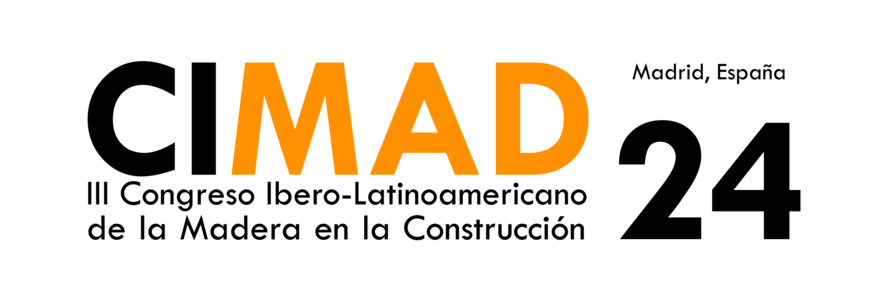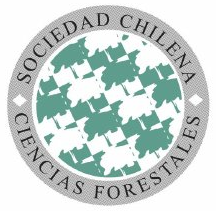Properties of thermally modified teakwood
Keywords:
Colorimetry, mechanical properties, thermogravimetry, Tectona grandis, wood modificationAbstract
Thermal modification is a treatment that seeks to improve the properties of wood and reduce the heterogeneity in its color. The objective of this work was to evaluate the effect of thermal treatment on the anatomical, chemical, physical, mechanical, colorimetric, and thermal stability properties of teakwood. For this, teakwood samples were treated by an industrial autoclave at final cycle temperature of 160 ºC. The reduction of cell wall thickness, the formation of cross-fissures and the crystallization of the wax inside the pores were observed in the anatomical structure. Chemically, the extractives evaporated and the polysaccharides ruptured, of which hemicellulose was the most affected. The heat treatment promoted lower equilibrium moisture, reducing the hygroscopicity and improving the dimensional stability of the wood. Considering the mechanical properties, the rupture modulus and the longitudinal and tangential hardness decreased after the heat treatment. The color of the wood changed significantly, from pink to dark brown. The treated wood had higher thermal stability, with greater weight loss at higher temperatures than the untreated wood.
Downloads
References
ASTM International. 2014. ASTM D-143-14: Standard Test Methods for Small Clear Specimens of Timber. West Conshohocken, PA, USA. http://www.astm.org/cgi-bin/resolver.cgi?D143-14
ASTM International. 2016. ASTM D-2244-16: Standard practice for calculation of color tolerances and color differences from instrumentally measured color coordinates. West Conshohocken, PA, USA. http://www.astm.org/cgi-bin/resolver.cgi?D2244-16
ASTM International. 2017. ASTM D-2395-17: Standard Test Methods for Density and Specific Gravity (Relative Density) of Wood and Wood-Based Materials. West Conshohocken, PA, USA. http://www.astm.org/cgi-bin/resolver.cgi?D2395-17
Bonfatti Júnior, E.A.; Lengowski, E.C. 2018. Colorimetry applied to wood science and technology. Pesqui Florest Bras 38: 1-13. e201601394. https://doi.org/10.4336/2018.pfb.38e201601394
Bhuiyan, T.; Hirai, N. 2005. Study of crystalline behavior of heat-treated wood cellulose during treatments in water. J Wood Sci 51(1): 42-47. https://doi.org/10.1007/s10086-003-0615-x
Bonduelle, G.M.; Iwakiri, S.; Trianoski, R.; Prata, J.G.; Rocha, V.Y. 2015. Analysis of wood density and shrinkage of Tectona grandis wood in axial and radial direction of the tree trunk. Floresta 45(4): 671-680. http://dx.doi.org/10.5380/rf.v45i4.31991
Boonstra, M.J.; Van Acker, J.; Tjeerdsma, B.F.; Kegel, E.V. 2007. Strength properties of thermally modified softwoods and its relation to polymeric structural wood constituents. Ann For Sci 64(7): 679-690. https://doi.org/10.1051/forest:2007048
Boonstra, M.J; Tjeerdsma, B. 2006. Chemical analysis of heat-treated softwoods. Holz Roh Werkst, 64: 204-211. https://doi.org/10.1007/s00107-005-0078-4
Boonstra, M.J.; Rijsdijk, J.F., Sander, C., Kegel, E.V., Tjeerdsma, B., Militz, H., Acker, J.V.; Stevens, M. 2006a. Microstructural and Physical aspects of heat-treated wood. Part 1. Softwoods. Maderas-Cienc Tecnol 8(3): 193-208. http://dx.doi.org/10.4067/S0718-221X2006000300006
Camargos, J.A.A.; Gonçalez, J.C. 2001. Applied colorimetry as instrument in the elaboration of a timber color chart. Bra Flor (71): 30-41.
Čekovská, H.; Gaff, M.; Makovická Osvaldová, L. M.; Kačík, F.; Kaplan, L.; Kubš, J. 2017. Tectona grandis Linn. and its fire characteristics affected by its thermal modification of wood. BioResources 12(2): 2805-2817. https://bioresources.cnr.ncsu.edu/resources/tectona-grandis-linn-and-its-fire-characteristics-affected-by-its-thermal-modification-of-wood/
Cetera, P.; Russo, D.; Milella, L.; Todaro, L. 2019. Thermo-treatment affects Quercus cerris L. wood properties and the antioxidant activity and chemical composition of its by-product extracts. Ind Crops Prod 130: 380-388. https://doi.org/10.1016/j.indcrop.2018.12.099
Chagas, S.F.; Evangelista, W.V.; Silva, J.C.; Macedo, A.M.; Carvalho, L. 2014. Properties of teakwood of different ages coming from thinning. Braz J Wood Sci 5(2): 138-150. http://dx.doi.org/10.12953/2177-6830.v05n02a08
Chaouch, M.; Dumarçay, S.; Pétrissans, A.; Pétrissans, M.; Gérardin, P. 2012. Effect of heat treatment intensity on some conferred properties of different European softwood and hardwood species. Wood Sci Technol 47(4): 663-673. https://doi.org/10.1007/s00226-013-0533-z
Chen, Y.; Tshabalala, M.A.; Gao, J.; Stark, N.M.; Fan, Y. 2014. Color and surface chemistry changes of extracted wood flour after heating at 120 °C. Wood Sci Technol 48 (1): 137-150. https://doi.org/10.1007/s00226-013-0582-3
Derkyi, N.S.A.; Bailleres, H.; Chaix, G.; Thevenon, M.F.; Oteng-Amoako, A.A.; Adu-Bredu, S. 2009. Colour variation in teak (Tectona grandis) wood from plantations across the ecological zones of Ghana. Ghana J Forestry 25: 40-48. https://doi.org/10.4314/gjf.v25i1.60698
Dias, A.C.C.; Marchesan, R.; Almeida, V.C.; Monteiro, T.C.; Moraes, C.B. 2018. Relationship between basic density and shrinkage in teca wood. Braz J Wood Sci 9(1): 37-44. http://dx.doi.org/10.12953/2177-6830/rcm.v9n1p37-44
Durlo, M.A.; Marchiori, J.N.C. 1992. Wood technology: retractability. CEPEF Série Técnica, 10. Santa Maria, Brazil.
Esteves, B.M.; Graça, J.; Pereira, H.M. 2008. Extractive composition and summative chemical analysis of thermally treated eucalypt wood. Holzforschung 62(3): 344-351. https://doi.org/10.1515/HF.2008.057
Esteves, B.M.; Pereira, H. M. 2009. Wood modification by heat treatment: A Review. BioResources 4(1): 370-404. https://ojs.cnr.ncsu.edu/index.php/BioRes/article/view/BioRes_04_1_%23%23%23%23_Esteves_P_Wood_Mod_Heat_Treatment
Federação da Agricultura e Pecuária do Estado de Mato Grosso. FAMATO. 2013. Diagnosis of Planted Forests in the State of Mato Grosso. IMEA. Brazil.
Fengel, D. 1966. On the changes of the wood and its components within the temperature range up to 200 ºC - Part 2. Holz Roh Werkst 24:98-109.
Gonçalvez, M.P.M.; Coffler, R.; Carvalho, A.M.; Garcia, R.A. 2007. Radial variation of basic density and fiber length of the wood of Tectona grandis L. Floram 14(1): 70-75. https://www.floram.org/article/588e2217e710ab87018b464c
Grinins, J.; Irbe, I.; Andersons, B.; Andersone, I.; Meija-Feldmane.; Janberga, A.; Pavlovics, G.; Sansonetti, E. 2016. Thermo-hydro treated (THT) birch plywood with improved service properties. Int Wood Prod J 7(4): 181-187. https://doi.org/10.1080/20426445.2016.1212963
Gunduz, G.; Aydemir, D.; Karakas, G. 2009. The effects of thermal treatment on the mechanical properties of wild Pear (Pyrus elaeagnifolia Pall.) wood and changes in physical properties. Mater Des 30(10): 4391-4395. https://doi.org/10.1016/j.matdes.2009.04.005
Hamada, J.; Pétrissans, A.; Mothe, F.; Ruelle, J.; Pétrissans, M.; Gérardin, P. 2017. Intraspecific variation of european oak wood thermal stability according to radial position. Wood Sci Technol 51(4): 785-794. https://doi.org/10.1007/s00226-017-0910-0
Hill, C. 2006. Wood Modification: Chemical, Thermal and Other Processes. Wiley, New York, NY, USA. https://doi.org/10.1002/0470021748
Hikita, Y.; Toyoda, T.; Azuma, M. 2001. Weathering testing of timber – discoloration. In High performance utilization of wood for outdoor uses: report on research project, Grant-in-Aid for Scientific Research. Inamura, Y (Ed.), Press-Net. Kyoto, Japan. p. 27-32.
Indústria Brasileira de Árvores. IBÁ. 2019. Report 2019. IBÁ. Sao Paulo, Brazil. https://iba.org/datafiles/publicacoes/relatorios/iba-relatorioanual2019.pdf
Kokutse, A.D.; Bailleres, H.; Stokes, A.; Kokou, K. 2004. Proportion and quality of heartwood in togolese teak (Tectona grandis L.f.). Forest Ecol Manag 189(1-2): 37–48. https://doi.org/10.1016/j.foreco.2003.07.041
Kokutse, A.D.; Stokes, A.; Baillères, H.; Kokou, K.; Baudasse, C. 2006. Decay resistance of Togolese teak (Tectona grandis L.f) heartwood and relationship with colour. Trees 20(3): 219-223. https://doi.org/10.1007/s00468-005-0028-0
Korkut, S. 2008. The effects of heat treatment on some technological properties in Uludag fir (Abies bornmuellerinana Mattf.) wood. Build Environ 43(4): 422-428. https://doi.org/10.1016/j.buildenv.2007.01.004
Lemos, J.A.S.; Mendes, M.C.S.; Madi, J.P.S.; Pereira, B.L.C.; Oliveira, A.C. 2019. Influence of the propagation method on the production and quality of Tectona grandis wood. Adv For Sci 6(3): 761-765. http://dx.doi.org/10.34062/afs.v6i3.8183
Lengowski, E.C.; Muniz, G.I.B.; Klock, U.; Nisgoski, S. 2018. Potential use of NIR and visible spectroscopy to analyze chemical properties of thermally treated wood. Maderas-Cienc Tecnol 20(4): 627-640. http://dx.doi.org/10.4067/S0718-221X2018005041001
Lengowski, E.C.; Muniz, G.I.B.; Nisgoski, S.; Magalhães, W.L.E. 2013. Cellulose acquirement evaluation methods with different degrees of crystallinity. Sci For 41(98): 185-194. https://www.ipef.br/publicacoes/scientia/nr98/cap04.pdf
Lima, I.L.; Florsheim, S.M.B.; Longui, E.L. 2009. Influence of spacing on some physical properties of Tectona grandis Linn. f. Cerne 15(2): 244-250. http://cerne.ufla.br/site/index.php/CERNE/article/view/209
Lopes, J.O.; Garcia, R.A.; Nascimento, A.M.; Latorraca, J.V.F. 2014. Physical properties of heat-treated teakwood. Floram 21(4): 569-577. http://dx.doi.org/10.1590/2179-8087.040213
Méndez-Mejías, L.D.; Moya, R. 2016. Effects on density, shrinking, color changing and chemical surface analysis through FTIR of Tectona grandis thermo-treated. Sci For 44(122): 811- 820. http://dx.doi.org/10.18671/scifor.v44n112.03
Mészáros, E.; Jakab, E.; Várhegyi, G. 2007. TG/MS, PyGC/MS and THM-GC/MS study of the composition and thermal behavior of extractive components of Robinia pseudoacacia. J Anal Appl Pyrol 79(1-2): 61–70. https://doi.org/10.1016/j.jaap.2006.12.007
Ming, G.; Biaocan, L.; Shou Sheng, Y.; Min, Z. 2005. Flame retardance of wood treated with guanidine compounds characterized by thermal degradation behavior. J Anal Appl Pyrol 73(1): 151-156. https://doi.org/10.1016/j.jaap.2005.01.006
Modes, K.S.; Santini, E.J.; Vivian, M.A.; Haselein, C.R. 2017. Effect of heat treatment on mechanical properties of Pinus taeda and Eucalyptus grands woods. Cienc Florest 27(1): 291-302. https://doi.org/10.5902/1980509826467
Motta, J.P.; Alves, R.C.; Paes, J.B. 2010. Effect of heat treatment on the static flexural strength of wood Tectona grandis L.f. In II Simpósio de Ciência e Tecnologia da Madeira do Rio de Janeiro II SIMADERJ. Rio de Janeiro, Brazil.
Niamké, F.B.; Amusant, N.; Charpentier, J-P.; Chaix, G.; Baissac, Y.; Boutahar, N., Jay-Allemand, C. 2011. Relationships between biochemical attributes (non-structural carbohydrates and phenolics) and natural durability against fungi in dry teakwood (Tectona grandis L. f.). Ann Forest Sci 68(1): 201-211. https://doi.org/10.1007/s13595-011-0021-2
Niamké, F.B.; Amusant, N.; Kadio, A.A.; Thevenon, M-F.; Nourissier, S.; Adima, A.A.; Chaixh, G. 2014. Rapid prediction of phenolic compounds as chemical markers for the natural durability of teak (Tectona grandis Linn f.) heartwood by near infrared spectroscopy. J Near Infrared Spec 22(1): 35-43. https://doi.org/10.1255%2Fjnirs.1091
Nocetti, M.; Rozenberg, P.; Chaix, G.; Macchioni, N. 2011. Provenance effect on the ring structure of teak (Tectona grandis L.f.) wood by X-ray microdensitometry. Ann Forest Sci 68(8): 1375-1383. https://doi.org/10.1007/s13595-011-0145-4
Nuopponen, M.; Vuorinen, T.; Jamsä, S.; Viitaniemi, P. 2005. Thermal modifications in softwood studied by FT-IR and UV resonance Raman spectroscopies. J Wood Chem Technol 24(1): 13-26. https://doi.org/10.1081/WCT-120035941
Ozsahin, S.; Murat, M. 2017. Prediction of equilibrium moisture content and specific gravity of heat treated wood by artificial neural networks. Eur J Wood Wood Prod 76(2): 563-572. https://doi.org/10.1007/s00107-017-1219-2
Pereira, B.L.C.; Carneiro, A.C.O.; Carvalho, A.M.M.L.; Trugilho, P.F.; Melo, I.C.N.A.; Oliveira, A.C. 2013. Study of thermal degradation of Eucalyptus wood by thermogravimetry and calorimetry. Rev Árvore 37(3): 567-576. https://doi.org/10.1590/S0100-67622013000300020
Poletto, M.; Zattera, A.J.; Santana, R.M.C. 2012. Thermal decomposition of wood: kinetics and degradation mechanisms. Bioresour Technol 126: 7-12. https://doi.org/10.1016/j.biortech.2012.08.133
Poncsák, S.; Kocaefe, D.; Bouazara, M.; Pichette, A. 2006. Effect of high temperature treatment on the mechanical properties of birch (Betula papyrifera). Wood Sci Technol 40(8): 647-663. https://doi.org/10.1007/s00226-006-0082-9
Pratiwi, L.A.; Darmawan, W.; Priadi, T.; George, B.; Merlin, A.; Gérardin, C.; Dumarçay, S.; Gérardin, P. 2019. Characterization of thermally modified short and long rotation teaks and the effects on coatings performance. Maderas-Cienc Tecnol 21(2): 209-222. http://dx.doi.org/10.4067/S0718-221X2019005000208
Repellin, V.; Guyonnet, R. 2005. Evaluation of heat-treated wood swelling by differential scanning calorimetry in relation to chemical composition. Holzforschung 59(1): 28-34. https://doi.org/10.1515/HF.2005.005
Santos, D.V.B.; Moura, L.F.; Brito, J.O. 2014. Effect of heat treatment on color, weight loss, specific gravity and equilibrium moisture content of two low market valued tropical woods. Wood Res 59(2): 253-264.
Shi, J.; Lu, Y.; Zhang, Y.; Cai, L.; Shi, S. 2018. Effect of thermal treatment with water, H2SO4 and NaOH aqueous solution on color, cell wall and chemical structure of poplar wood. Sci Rep 8(1): 17735. https://doi.org/10.1038/s41598-018-36086-9
Silva, E.J.; Cremonez, V.G.; Nisgoski, S. 2019. Color change and thermogravimetric analysis of thermally treated Eucalyptus grandis wood. Braz J Wood Sci 10(1): 39-47. https://doi.org/10.12953/2177-6830/rcm.v10n1p39-47
Sjöström, E. 1981. Wood Chemistry fundamentals and applications. Academic Press, New York, NY, USA.
Technical Association of Pulp and Paper Industry. 2014. TAPPI T 257 sp-14: Sampling and preparing wood for analysis. Atlanta, GA: TAPPI Press, USA. https://www.tappi.org/content/sarg/t257.pdf
Technical Association of Pulp and Paper Industry. 2015. TAPPI T 222 om-15: Acid-insoluble lignin in wood and pulp. Atlanta, GA: TAPPI Press, USA. https://www.tappi.org/content/SARG/T222.pdf
Technical Association of Pulp and Paper Industry. 2017. TAPPI T 204 cm-17: Solvent extractives of wood and pulp. Atlanta, GA: TAPPI Press, USA. https://www.tappi.org/
Tjeerdsma, B.; Boonstra, M.; Pizzi, A.; Tekely, P.; Militz, H. 1998. Characterization of thermally modified wood: molecular reasons for wood performance improvement. Holz Roh Werkst 56: 149. https://doi.org/10.1007/s001070050287
Tjeerdsma, B.; Militz, H. 2005. Chemical changes in hydroheat wood: FTIR analysis of combined hydroheat and dry heat-treated wood. Holz Roh Werkst 63(2): 102-111. http://dx.doi.org/10.4067/S0718-221X2013005000020
Unsal, O.; Korkut, S.; Atik, C. 2003. The effect of heat treatment on some properties and colour in eucalyptus (Eucalyptus camaldulensis Dehn.) wood. Maderas-Cienc Tecnol 5(2): 145-152. http://dx.doi.org/10.4067/S0718-221X2003000200006
Wang, S.; Liu, Q.; Luo, Z.; Wen, L.; Cen, K. 2007. Mechanism study on cellulose pyrolysis using thermogravimetric analysis coupled with infrared spectroscopy. Front Energy Power Eng Chin 4(1): 413-419. https://doi.org/10.1007/s11708-007-0060-8
Weiland, J.; Guyonnet, R. 2003. Study of chemical modifications and fungi degradation of thermally modified wood using DRIFT spectroscopy. Holz Roh Werkst 61(3): 216-220. https://doi.org/10.1007/s00107-003-0364-y
Wheeler, E.; Baas, P.; Gasson, P. 1989. IAWA list of microscopic features for hardwood identification. IAWA Bulletin 10(3): 219-332. https://doi.org/10.1002/fedr.19901011106
Wikberg, H.; Maunu, S.L. 2004. Characterization of thermally modified hard and softwoods by 13C CPMAS NMR. Carbohydr Polym 4(7): 461-466. https://doi.org/10.1016/j.carbpol.2004.08.008
Yildiz, U.C.; Yildiz, S.; Gezer, E.D. 2005. Mechanical and chemical behavior of beech wood modified by heat. Wood Fiber Sci 37(3): 456-461. https://wfs.swst.org/index.php/wfs/article/view/2034
Downloads
Published
How to Cite
Issue
Section
License

This work is licensed under a Creative Commons Attribution 4.0 International License.
Los autores/as conservarán sus derechos de autor y garantizarán a la revista el derecho de primera publicación de su obra, el cuál estará simultáneamente sujeto a la Licencia de Reconocimiento de Creative Commons CC-BY que permite a terceros compartir la obra siempre que se indique su autor y su primera publicación esta revista.
































